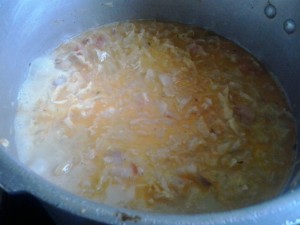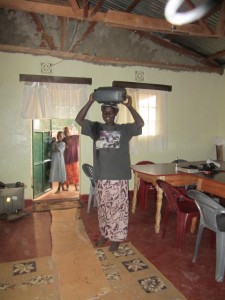After making it through our 30-day Local Food challenge, and deciding to make it a bit more permanent (but also a little more flexible), I’ve decided that I really like the simplicity of buying only a short list of food items each week and eating simple, somewhat repetitive meals. Granted, when the subject of furlough came up in a recent conversation, we suddenly began discussing all the favorite eateries we might like to visit if we ever went back to America. Yeah…moments of weakness, but I digress.
I’m still pretty surprised that we seem to be doing so well on plus-or-minus 12 grocery items per week. What I think of as our “dirty dozen” includes staples from our grain storage: maize, beans, and rice, as well as items we can easily buy at the local shops: baking powder, salt, eggs, and milk. We go to the market once a week for the remainder: tomatoes, peppers, onions, garlic, potatoes, and cabbage. We’ve ended up making somewhat permanent exceptions for the following items, which we pick up in Kitale: a few seasonings (Italian seasoning, chili powder and cinnamon); Ghee or margarine; quality vegetable shortening (the locals call it “cooking fat,” and though we can buy it at the our neighborhood shops, it’s a bright yellow, sub-standard variety and I just can’t bring myself to use it unless I absolutely have to); and cocoa (for our morning hot chocolate, which is one of the few ways we get milk into our diet on a daily basis…we have to boil it but then can’t refrigerate). We’ve gotten a little more flexible after the 30-day challenge and also occasionally have spaghetti…and pizza was a must-have for Hannah’s recent birthday celebration. I’m also trying to get fruit once per week at the market, since the avocadoes and bananas that had been coming to our door somewhat regularly have now been out-of-season for a while.
Along with wanting to eat more locally/more inexpensively/more simply, we’ve also (within the past couple of months) eliminated beef and store-bought chicken from our diet. This was a decision made in light of Biblical teachings because of the culture we find ourselves in. We either slaughter a chicken or buy pork from the local butchery once a week, and recently we found a good source for mutton that we’ll probably have now and then.
Our “dirty dozen” shopping list and the resulting simplified food menus have been good for our food budget but more than that, beneficial in reminding us that what we were once used to in terms of meals are certainly not “normal” to the vast majority of the rest of the world. It has also been a very helpful spiritual discipline in terms of conquering the flesh. We want to continue to challenge ourselves to be increasingly less indulgent in terms of food so that we will not find ourselves slaves to our stomachs. Throughout this process of streamlining, I have found myself thinking often of Finny Kuruvilla’s words in King Jesus Claims His Church (p. 205):
The world and the media exert considerable force on our minds. Unless we are consciously resisting its pull, we will be prey. The world promotes stimulation and thrill-seeking through the palate. The world chases after a new delicacy and flavor with nearly every meal, fostering the lust of the flesh. Thus while all foods are clean and to be received with thanksgiving (Mark 7:19; 1 Tim. 4:4), believers should be content to eat simple and repetitive meals. This battle is more easily won if addressed early; one’s tastes are developed in childhood. Insofar as possible, parents should provide simple, nutritious meals that emphasize vegetables, legumes, and while grains, rather than fats, meats, and sweets. Restaurant patronage should be minimized to teach children contentment with simple home cooking. Few people think of these disciplines as connected to spiritual victory, but they surely are.
…The connections between food, self-discipline, and spiritual power are profound.
They are profound, indeed…




